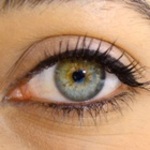Glaucoma is actually a range of conditions in which the common feature is damage to the optic nerve.
Open Angle Glaucoma
Primary Open Angle Glaucoma is the most common form of glaucoma. It happens when the eye's drainage canals resist the outflow of fluid. This results in the pressure in the eye increasing because the fluid cannot drain out of the eye. Most people have no symptoms and no early warning signs.
Angle Closure Glaucoma
The angle of the eye is embedded inside the eye at the junction of the cornea externally and the iris internally. If the path of fluid to the angle gets blocked, fluid will continue to be made at a normal rate but will be unable to exit the eye, allowing the pressure in the eye to build up to a harmful level. This is what happens in angle-closure glaucoma. The angle may not be allowing sufficient outflow for a variety of reasons. If the person was born with a narrow angle, it will become even narrower with age.
People who are far-sighted (hypermetropic) or from Asian descent are at higher risk of angle closure glaucoma.
Normal Pressure Glaucoma
In Normal Pressure Glaucoma the optic nerve is damaged even though eye pressure is not particularly high. It is not yet understood why some people suffer optic nerve damage despite having intraocular pressures in the "normal" range.
Pseudoexfoliation Syndrome
In Pseudoexfoliation Syndrome the trabecular meshwork, (the sponge which drains fluid out of the eye), becomes blocked by flaky, white material. It is estimated that Pseudoexfoliation Syndrome accounts for about 25% of glaucoma worldwide.
Pigment Dispersion Syndrome
Pigment Dispersion Syndrome is another condition in which the trabecular meshwork, (the sponge which drains fluid out of the eye), is unable to function properly. In Pigment Dispersion Syndrome black pigment granules clog the meshwork, which prevents fluid from draining properly. People who are short-sighted (myopic) are at higher risk of this type of glaucoma.
Paediatric Glaucoma
Children do get glaucoma. In many cases the cause is genetic, but sometimes Paediatric Glaucoma can occur following cataract surgery or following trauma to the eye, or ocular inflammation.








Steve Corbett - 9 years ago
I was diagnosed with Glaucoma in 2008, with the co-operation of the Kiwi band Fourmyula, who’s track “Nature”, was voted the nation’s best song of the past 75 years in the 2001 APRA poll, I put together the following video which includes their single “Home”
In my humble opinion the lyrics within the song are almost word for word perfect in describing Glaucoma…
https://www.youtube.com/watch?v=X4b-wETb-mY